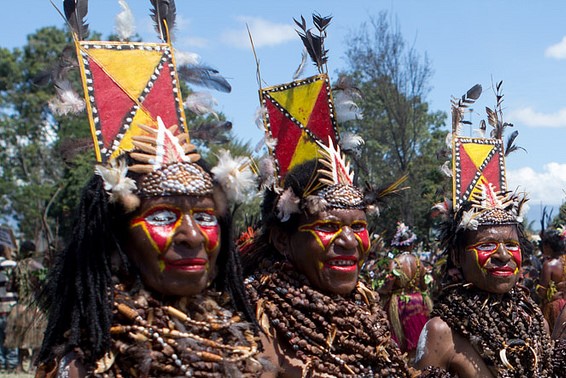Bell, RA 2017 (ed.), My Walk to Equality, PukPuk Publications, Queensland. Available from Amazon.
Rashmii Amoah Bell’s edited collection is an important and high impact addition to the growing body of literature written by PNG authors. This book stands out as a collection of contributions from female authors only. There are 83 contributions (including two forewords) to this collection from 40 writers. Some of the women who wrote for this collection have been writing for some time and for others, taking part in this writing project was their first experience of working towards a publication.
The material included comprises essays, stories and poetry. They are grouped together into four sections: ‘Relationships’, ‘Self-Awareness’, ‘Challenging Gender Roles and Breaking Glass Ceilings’, and ‘Legacy’. However, readers will probably find, as I did, that these divisions are not particularly concrete and that similar themes and messages appear throughout the book, regardless of where a particular piece appears.
Some of these recurring themes are: the significance of education, including the struggle that some experience in order to go to school or university; the importance of family, which can bring both positive and negative impacts; and the drive to bring about improvement for oneself, one’s family, one’s community and one’s country. Some report success and some document years of persistence in the face of constant setbacks.
This collection does not shy away from some of the most challenging aspects of women’s experience in PNG. There are several contributions that address the experience and impacts of gender based violence. One of the most challenging pieces to read is ‘At Least I Did Try’ by Roslyn Tony (p 144), which provides an eyewitness account of the killing of a woman suspected of witchcraft by her community.
But there are numerous pieces in this collection that will provide readers with opportunities to appreciate a much wider range of the varied experiences of Papua New Guinean women than may previously have been the case. In this book you will meet, lawyers, teachers, mothers, wives, mature women and young girls. All have a story to tell and have made good use of this platform to take their self-expression to a new level. One group that is under-represented is rural women and it would be great to see another project of this type that was designed to capture their stories to sit alongside this collection.
The My Walk to Equality project (for it is already bigger than one book) originated during a session at the 2016 Brisbane Writers’ Festival. Bell, along with other PNG authors Daniel Kumbon, Francis Nii and Martyn Namorong were challenged by the audience to write more positive stories about their homeland. From this seed, My Walk to Equality germinated and was hot housed to fruition in a very short space of time. It is a credit to Bell and those who have supported this project that the book was ready to launch in Port Moresby on International Women’s Day this year. There are some small errors that a longer process with more time for editing would probably have eliminated. The most significant is a reference to PNG never having had any female MPs. But these are not of a number or degree to undermine the overall integrity of this volume.
Earlier this year, I was privileged to be able to attend the Brisbane launch of My Walk to Equality. It was a vibrant event, attended by the editor and a number of the contributors. Not only did those of us who attended get a chance to purchase a copy of the book, but we also got to hear some of the women who wrote for this collection read from their pieces. Most memorable was Vanessa Gordon who read her poem ‘Drumbeat’ (p 41). The power of her words delivered in her own voice was an important reminder that whilst home grown literature is still developing in Papua New Guinea, it springs from a centuries old oral tradition whose impact remains strong.



The issues affecting women in PNG, as expressed by a few courageous women and girls, are real. It all happens right under the noses of men but we seem to turn a blind eye to these issues. Everyone should read what’s been expressed in this anthology, I’m in search of a copy myself.
You can purchase a copy via Amazon: https://www.amazon.com.au/My-Walk-Equality-Stories-Guinean/dp/1542429242